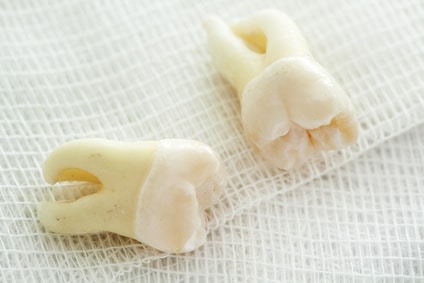
Do you know the ins and outs of wisdom teeth removal?
Dr. Eric Dahlen at Padden Dental office answers some common questions about wisdom teeth removal. And no it’s not a monster with lots of teeth. But what is it? Keep reading and find out.
Why do we have our wisdom teeth removed?
- Modern day people don’t have the rough and abrasive diets that we did thousands of years ago, so our teeth don’t wear out as fast. Here are some of the reasons why we recommend people have their wisdom teeth removed:
- They can cause an embarrassing smile by pushing other teeth forward causing the front teeth to crowd and become crooked.
- They can be hard to reach with a toothbrush without causing irritation to the back of the mouth making it difficult to clean resulting in cavities and gum disease.
- They could erupt only part way and create a flap of gum over the tooth creating a hiding place for food and bacteria.
- vThey could come in at an odd angle and cause a cavity to the tooth in front of it.
- It could decay under the gum.
Removal of your wisdom teeth may not be necessary if the teeth are:
- Grown in completely – meaning they are fully erupted.
- They are correctly positioned.
- They are biting properly.
- Can be cleaned as part of your daily hygiene practice.
What is a good age to have your wisdom teeth removed?
It can vary on the individual but a good age range is between 17 and 24 years. During this time the roots of the wisdom teeth may not be fully developed making it easier to remove them. This age range seems to bounce back quicker as healing is more predictable.
Most dentists in Vancouver, Washington feel that wisdom tooth removal should be done early to help reduce incidence of gum disease.
“I’m 19 and I don’t see a wisdom tooth back there…I won’t need to get them out since they are not coming in?”
You may still need a wisdom tooth removed. A wisdom tooth may not erupt for a number of reasons. An impacted wisdom tooth can be “stuck” from erupting by hitting the tooth in front of them. This can occur just under a layer of skin hidden from view. A wisdom tooth in this situation should be evaluated for removal with a Panographic radiograph x-ray (see above image). It is best to remove it before the root fully develops.
“I’m a bit nervous about having my wisdom teeth removed.”
That’s normal! We recognize that everyone has some level of anxiety with any dental visit. We work with patients and help them through their difficulties. We do this everyday! Making sure our patients are completely numb is the first step in making someone less fearful.
Sedation Dentistry is available
We can use a combination of nitrous oxide and a sleeping pill call Triazolam when you have someone else do the driving to and from our dental office. This combination does a great job relaxing patients for the procedure. It can also have an amnesia effect where the patient has little to no memory of having the wisdom tooth removed. IV sedation and general anesthesia are also available.
What can I expect at home?
Recovery at home is usually a couple of days and handled well with the prescribed pain medication. Following our office instructions of ice packs and keeping your head elevated, to reduce swelling, and avoid drinking through straws can make the patient more comfortable in the process.
An Impacted Wisdom Tooth X-ray
To evaluate the status of your wisdom teeth, a Dentist may take a special x-ray called a Panographic Radiograph (shown above). The image is an example of a Panographic Radiograph x-ray. The red circle is outlining an impacted wisdom tooth. Notice how the roots are not fully formed as the other teeth. Most people develop 4 wisdom teeth. This patient is special because she actually developed 5 wisdom teeth! Some people develop fewer than 4 wisdom teeth. The luckiest people don’t develop any at all!
Let me know if you can spot the other four wisdom teeth in th pano x-ray image above?
Dr. Eric Dahlen, Dentist in Vancouver, WA, Cascade Dental Padden-205
Looking for a Dentist in Vancouver Washington?
For more information or to evaluate your wisdom teeth please contact us at Padden Dental today.
